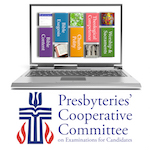The Presbyteries’ Cooperative Committee on Examinations for Candidates (PCC) has concurred with recommendations from a task force charged to review the Presbyterian Church (U.S.A.)’s Bible Content Examination (BCE).
Last fall the PCC -- “a body created by the presbyteries” to prepare and administer “any standard ordination examination approved by the General Assembly” (G-2.0607d) – asked the Committee on Theological Education (COTE) to form the task force to review the Bible Content Examinations that were administered between September 2015 and February 2017. Results on the four BCE exams conducted during that period were significantly lower than the historical average of about 80 percent “satisfactory” scores.
After its mid-February meeting in Louisville, the task force made three recommendations:
- that presbytery committees and commissions overseeing inquirers and candidates in the preparation for ministry process advise them “to take the BCE after a full year of theological education.”
- that COTE convene a group of Presbyterian Church (U.S.A.) biblical studies professors and COTE members to compile “a list of resources for study” and “produce a study guide specific to the BCE’s purpose of assessing general knowledge of the ‘stories, themes, and key passages’ of the Bible as they provide a foundation for Reformed ministry.”
- that the PCC “return to the practice of publicly releasing questions after their first use” in the Bible Content Examination.
At its March 27-April 1 meeting, the PCC concurred with the task force’s recommendation that inquirers and candidates complete at least one full year of theological education before taking the BCE.
The PCC noted that “historically, the BCE has been taken during the first year of study to identify areas of the canon for which the inquirer might benefit from focused study while in seminary, though there has always been a minimum score necessary to satisfy the BCE requirement in the preparation process.”
The PCC will now describe the primary purpose of the BCE as “to determine whether a person … has the necessary familiarity with the Scriptures that the church expects in its teaching elders.”
At its February 21-23 meeting at Austin Presbyterian Theological Seminary, COTE concurred with the task force’s recommendation that it compile the list of study resources and a study guide for the BCE.
The PCC also concurred with the task force’s final recommendation to resume publishing previously asked questions, a practice that was discontinued when the BCE exam went online in 2009.
To assure equitable access, the PCC has asked Preparation for Ministry support staff in the Mid Council Ministries area of the Office of the General Assembly to prepare a website where all questions that have been developed for the online BCE since the fall of 2009 will be published in English, Korean, and Spanish. As future exams are given, any new questions on those exams will be added to the website in all three languages.
The website will also include guidance from the PCC’s Handbook to the Standard Ordination Examinations regarding the structure of the BCE and preparation strategies. The goal is for the website to be available on or before August 1, when the PCC would make available its online practice BCE for those registered to take the exam on September 1.
In other actions at its recent meeting, the PCC approved budgets for the remainder of 2017 and 2018 that will maintain the current registration fee for all standard ordination exams of $65 per exam until at least the summer of 2019. Registration fees for exams were last increased in the summer of 2015. Prior to the completion of the move to fully online administration and evaluation of the exams in the fall of 2013, the registration fee had been $100 per exam.

